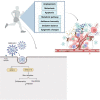Combined Effects of Exercise Training and Nutritional Supplementation in Cancer Patients in the Context of the COVID-19: A Perspective Study
- PMID: 35356739
- PMCID: PMC8959344
- DOI: 10.3389/fnut.2022.847215
Combined Effects of Exercise Training and Nutritional Supplementation in Cancer Patients in the Context of the COVID-19: A Perspective Study
Abstract
The 2019 coronavirus (COVID-19) epidemic, has caused unprecedented global social and economic impacts and many deaths. Many risk factors have been identified in the progression of COVID-19 to severe and critical stages, and it is shown that the coronavirus appears more severely in people with cancer. Pro-inflammatory status and weakened immune system due to cancer-related treatments can be determinants in the immune system's response to the coronavirus in these patients. Higher physical activity levels are associated with lower hospitalization rates and mortality in COVID-19. Also, regular exercise training can improve immune system responses, modulate inflammatory responses, and improve psychological parameters in cancer patients. The interactive effects of nutritional supplements on immune responses and anti-inflammatory status have been shown in some studies. The purpose of this perspective article was to investigate the interaction between dietary supplementation and regular physical exercise in controlling risk factors associated with coronavirus in cancer patients. In addition to appropriate dietary habits, some nutritional supplements, especially vitamin D, have been shown to improve the immune system's response against COVID-19 and cancer. Using lifestyle strategies such as regular physical activity and intake of functional compounds as supplements can be effective in treatment outcomes, quality of life, and overall survival in cancer patients. We proposed that combining dietary supplements and exercise training in cancer patients can boost immune responses against COVID-19 and probably improve vaccine responses. Angiotensin (ANG)-(1-7) Mas receptor axis can probably activate following exercise training and vitamin D combination. And can prevent pulmonary injury, hematological alterations, and hyperinflammatory state in COVID-19.
Keywords: aerobic exercise training; cancer; coronavirus; immune response; vitamin D.
Copyright © 2022 Molanouri Shamsi, Vahed, Hekmatikar and Suzuki.
Conflict of interest statement
The authors declare that the research was conducted in the absence of any commercial or financial relationships that could be construed as a potential conflict of interest.
Figures

Similar articles
-
Physical Activity and Natural Products and Minerals in the SARS-CoV-2 Pandemic: An Update.Ann Appl Sport Sci. 2021 Spring;9(1):e976. doi: 10.29252/aassjournal.976. Ann Appl Sport Sci. 2021. PMID: 35237740 Free PMC article.
-
Anti-inflammatory Dietary Interventions and Supplements to Improve Performance during Athletic Training.J Am Coll Nutr. 2015;34 Suppl 1:62-7. doi: 10.1080/07315724.2015.1080548. J Am Coll Nutr. 2015. PMID: 26400438
-
Potential role of Nigella sativa supplementation with physical activity in prophylaxis and treatment of COVID-19: a contemporary review.Sport Sci Health. 2021;17(4):849-854. doi: 10.1007/s11332-021-00787-y. Epub 2021 May 28. Sport Sci Health. 2021. PMID: 34093778 Free PMC article. Review.
-
Prevention of falls and fall-related injuries in community-dwelling seniors: an evidence-based analysis.Ont Health Technol Assess Ser. 2008;8(2):1-78. Epub 2008 Oct 1. Ont Health Technol Assess Ser. 2008. PMID: 23074507 Free PMC article.
-
Exercise and immune function. Recent developments.Sports Med. 1999 Feb;27(2):73-80. doi: 10.2165/00007256-199927020-00001. Sports Med. 1999. PMID: 10091272 Review.
Cited by
-
Anti-cancer effects of genistein supplementation and moderate-intensity exercise in high-fat diet-induced breast cancer via regulation of inflammation and adipose tissue metabolism in vivo and in vitro.BMC Complement Med Ther. 2025 Jul 2;25(1):223. doi: 10.1186/s12906-025-04968-x. BMC Complement Med Ther. 2025. PMID: 40604704 Free PMC article.
References
LinkOut - more resources
Full Text Sources
Miscellaneous

